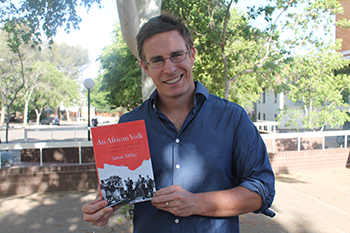Latest News Archive
Please select Category, Year, and then Month to display items
02 January 2025
|
Story Edzani Nephalela
|
Photo Lethabo Machabaphala
 From the left are, Prof John Klaasen, Dean of the Faculty of Theology and Religion; Prof Vasu Reddy, Deputy Vice-Chancellor: Research and Internationalisation at the UFS; Prof Anthea Rhoda, acting Vice-Chancellor and Principal of the UFS; Prof Allan Boesak; Prof Nico Koopman, Deputy Vice-Chancellor: Social Impact, Transformation and Personnel at Stellenbosch University; and Dr Eugene Fortein, Senior Lecturer: Historical and Constructive Theology at Prof Boesak’s book launch.
From the left are, Prof John Klaasen, Dean of the Faculty of Theology and Religion; Prof Vasu Reddy, Deputy Vice-Chancellor: Research and Internationalisation at the UFS; Prof Anthea Rhoda, acting Vice-Chancellor and Principal of the UFS; Prof Allan Boesak; Prof Nico Koopman, Deputy Vice-Chancellor: Social Impact, Transformation and Personnel at Stellenbosch University; and Dr Eugene Fortein, Senior Lecturer: Historical and Constructive Theology at Prof Boesak’s book launch.
In a world increasingly defined by the stark contrasts of power and vulnerability, the concept of democracy often reveals itself as a double-edged sword. For the children of struggle – those who have grown up amid the chaos of inequality and conflict – democracy can feel like a distant promise, an ideal often outmanned by the realities they face. The deception of hope lingers in the air as aspirations clash with systemic barriers, leaving many to navigate a landscape where a harsh daily existence obscures the principles of freedom and justice. This exploration seeks to uncover the intricate dynamics between hope and disillusionment, shedding light on the lived experiences of those who yearn for a brighter future yet grapple with the weight of unfulfilled promises.
This was the essence of the public lecture titled Outmanned by Democracy: Children of Struggle, Deception, and Hope, presented by Prof Allan Boesak, a theologian and political activist, on the Bloemfontein Campus.
Prof Boesak confronted the continuous socio-economic challenges faced by South Africa and other nations, including racism, narrow ethnic nationalism, and the revival of tribalism. He emphasised the role of churches in tackling these issues. “The responsibility of churches is to articulate what politicians are often afraid to say,” he stated. “Put your ideologies into practice and leverage your power as ministers of the Word to shape the future and reclaim the dignity of your people. This is where unity transcends colour and stature. Consider the various roles that churches could play in reconciling communities, as seen in the Gaza crisis.”
During his visit to the UFS Faculty of Theology and Religion, Prof Boesak also launched a four-volume set titled The Fire, The River and the Scorched Earth: Fifty Years of Black Theology Through the Lens of Allan Boesak. The first three volumes include his lectures and responses from various theologians, while the fourth contains his sermons. This body of work aims to document, critique, and celebrate the contributions of black theology, highlighting its role in the struggle for justice and liberation and underscoring Prof Boesak’s unwavering commitment to freedom, liberation, and democracy.
In a time when hope and disillusionment coexist, Prof Boesak’s insights remind us of the transformative power of faith and activism in the continuing fight for a more equitable world
US author launches book at UFS on African volk
2016-10-17

Dr Jamie Miller, Postdoctoral Fellow at the
University of Pittsburgh and author of
An African Volk: The Apartheid Regime
and Its Search for Survival.
Photo: Rulanzen Martin
“I realised the importance of not just accessing the policies and political approaches of the leaders of the apartheid regime, but understanding the ideas and world views that informed them. Part of the solution to this was to learn Afrikaans.”
This is according to Dr Jamie Miller, a Postdoctoral Fellow at the University of Pittsburgh, on how he went about getting inside the mind of South Africa’s apartheid regime in order to complete his book, An African Volk: The Apartheid Regime and Its Search for Survival.
The book was launched on 11 October 2016 by the Archive for Contemporary Affairs at the University of the Free State on the Bloemfontein Campus.
Volk refers to the Afrikaner nationalist movement
The book is an ambitious new international history of 1970s apartheid South Africa. It is based on newly declassified documents and oral histories, the majority in Afrikaans, which focus on the regime’s attempts to turn the new political climate to its advantage.
The term volk refers to the Afrikaner nationalist movement, also known as Afrikanerdom. The story of Afrikaner nationalism was the medium through which the regime gained power.
Four main messages from the book
Dr Miller says there are four main messages for his readers. Firstly, the apartheid regime looked to contest and hijack new ideas and norms that formed the postcolonial world, and secondly, that we need to start thinking more seriously about the Cold War in terms of domestic politics, not just geopolitics.
Thirdly, South Africa should be integrated into histories of the global South, and lastly, we should conceptualise the apartheid regime by looking at it not just as an imperial holdover, but also by looking at what was happening in the world in the time period in question.